Reviewing Evidence-Based Psychotherapies for Postpartum Depression
VerifiedAdded on 2023/06/12
|13
|1545
|240
Literature Review
AI Summary
This literature review synthesizes evidence-based practices for addressing postpartum depression, focusing on the effectiveness of various psychotherapeutic interventions. It examines studies evaluating systemic interpersonal psychotherapy, cognitive behavioral therapy, and dyadic approaches, highlighting their impact on improving maternal mental health. The review identifies key variables such as social support, clinical depression severity, and the use of tools like the Edinburgh Postnatal Depression Scale (EPDS) for early detection. It also addresses the importance of properly trained caregivers and tailored interventions to meet the specific needs of new mothers, while acknowledging limitations such as small sample sizes and reliance on self-reporting scales. The analysis of multiple studies reveals that interpersonal psychotherapy (IPT) and relational treatments can be particularly useful in alleviating postpartum depression, emphasizing the significance of engaging relatives and providing comprehensive support to enhance treatment outcomes. Desklib offers a platform for students to access similar solved assignments and past papers for further study.
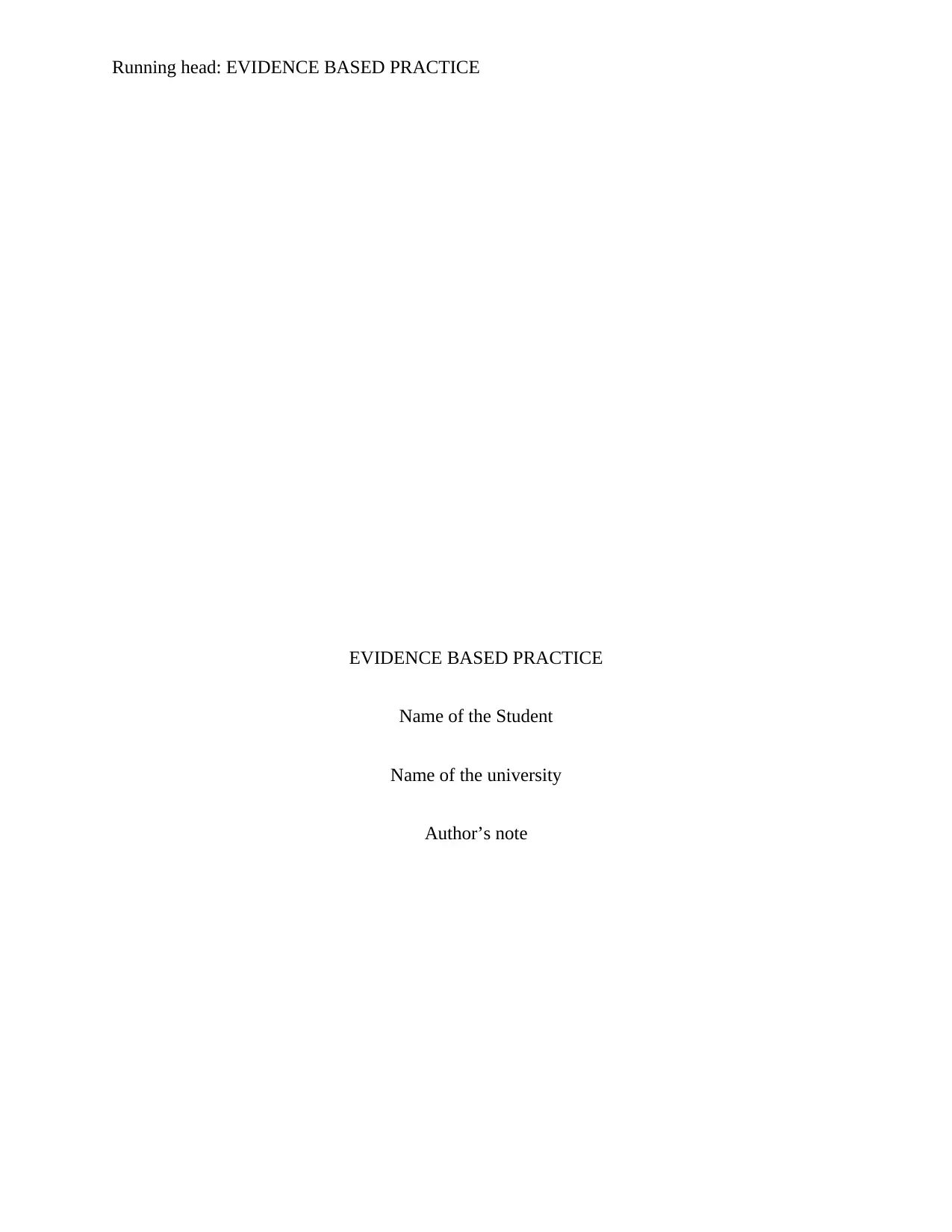
Running head: EVIDENCE BASED PRACTICE
EVIDENCE BASED PRACTICE
Name of the Student
Name of the university
Author’s note
EVIDENCE BASED PRACTICE
Name of the Student
Name of the university
Author’s note
Paraphrase This Document
Need a fresh take? Get an instant paraphrase of this document with our AI Paraphraser
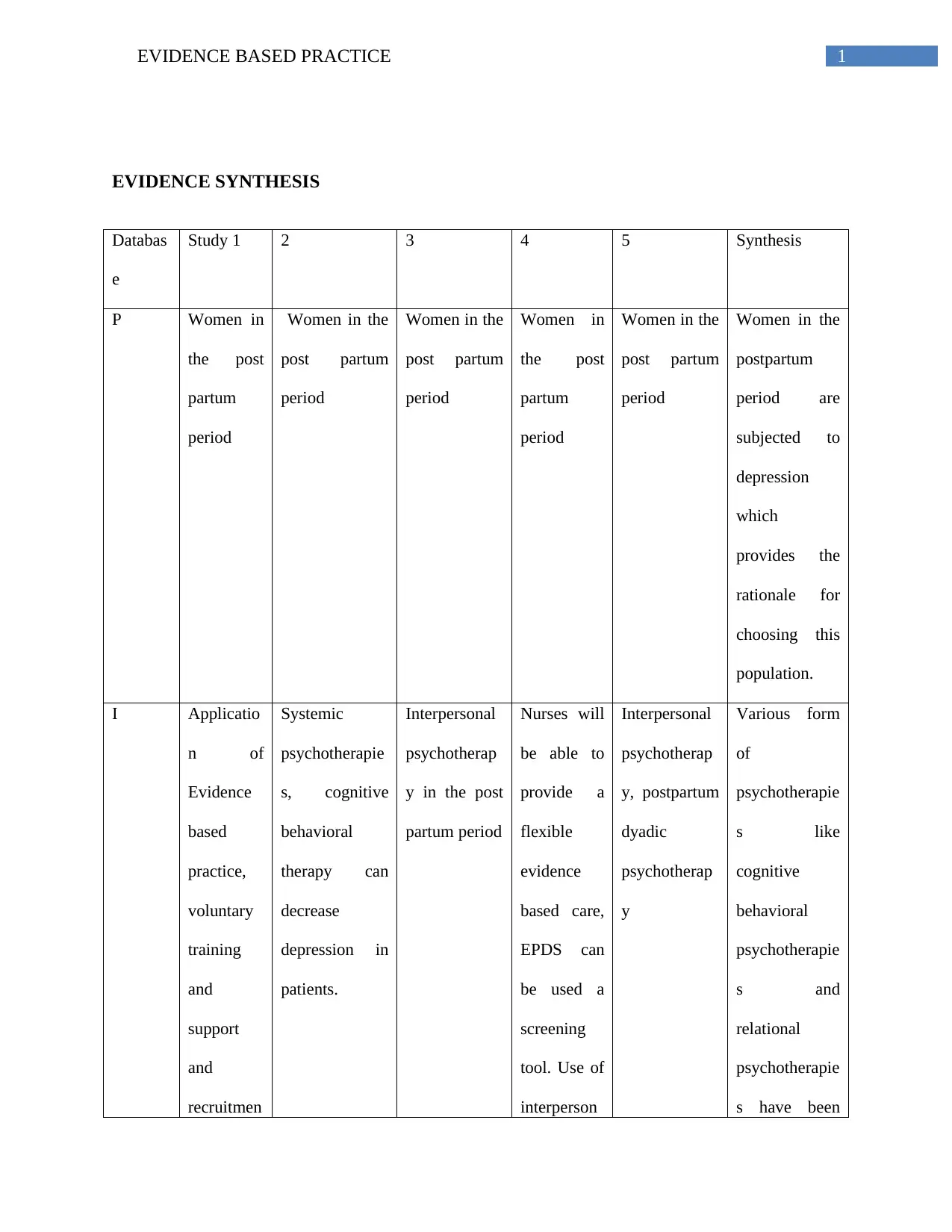
1EVIDENCE BASED PRACTICE
EVIDENCE SYNTHESIS
Databas
e
Study 1 2 3 4 5 Synthesis
P Women in
the post
partum
period
Women in the
post partum
period
Women in the
post partum
period
Women in
the post
partum
period
Women in the
post partum
period
Women in the
postpartum
period are
subjected to
depression
which
provides the
rationale for
choosing this
population.
I Applicatio
n of
Evidence
based
practice,
voluntary
training
and
support
and
recruitmen
Systemic
psychotherapie
s, cognitive
behavioral
therapy can
decrease
depression in
patients.
Interpersonal
psychotherap
y in the post
partum period
Nurses will
be able to
provide a
flexible
evidence
based care,
EPDS can
be used a
screening
tool. Use of
interperson
Interpersonal
psychotherap
y, postpartum
dyadic
psychotherap
y
Various form
of
psychotherapie
s like
cognitive
behavioral
psychotherapie
s and
relational
psychotherapie
s have been
EVIDENCE SYNTHESIS
Databas
e
Study 1 2 3 4 5 Synthesis
P Women in
the post
partum
period
Women in the
post partum
period
Women in the
post partum
period
Women in
the post
partum
period
Women in the
post partum
period
Women in the
postpartum
period are
subjected to
depression
which
provides the
rationale for
choosing this
population.
I Applicatio
n of
Evidence
based
practice,
voluntary
training
and
support
and
recruitmen
Systemic
psychotherapie
s, cognitive
behavioral
therapy can
decrease
depression in
patients.
Interpersonal
psychotherap
y in the post
partum period
Nurses will
be able to
provide a
flexible
evidence
based care,
EPDS can
be used a
screening
tool. Use of
interperson
Interpersonal
psychotherap
y, postpartum
dyadic
psychotherap
y
Various form
of
psychotherapie
s like
cognitive
behavioral
psychotherapie
s and
relational
psychotherapie
s have been
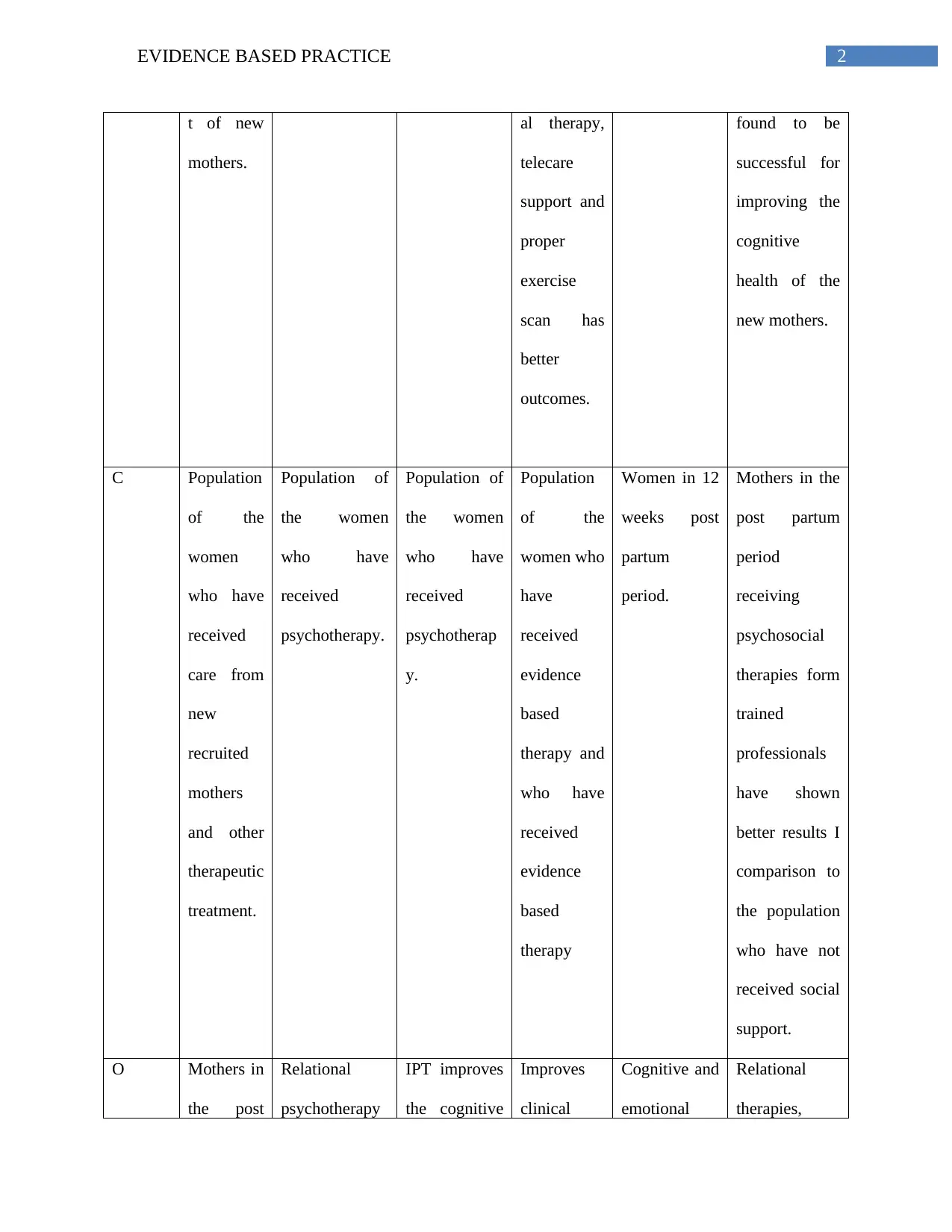
2EVIDENCE BASED PRACTICE
t of new
mothers.
al therapy,
telecare
support and
proper
exercise
scan has
better
outcomes.
found to be
successful for
improving the
cognitive
health of the
new mothers.
C Population
of the
women
who have
received
care from
new
recruited
mothers
and other
therapeutic
treatment.
Population of
the women
who have
received
psychotherapy.
Population of
the women
who have
received
psychotherap
y.
Population
of the
women who
have
received
evidence
based
therapy and
who have
received
evidence
based
therapy
Women in 12
weeks post
partum
period.
Mothers in the
post partum
period
receiving
psychosocial
therapies form
trained
professionals
have shown
better results I
comparison to
the population
who have not
received social
support.
O Mothers in
the post
Relational
psychotherapy
IPT improves
the cognitive
Improves
clinical
Cognitive and
emotional
Relational
therapies,
t of new
mothers.
al therapy,
telecare
support and
proper
exercise
scan has
better
outcomes.
found to be
successful for
improving the
cognitive
health of the
new mothers.
C Population
of the
women
who have
received
care from
new
recruited
mothers
and other
therapeutic
treatment.
Population of
the women
who have
received
psychotherapy.
Population of
the women
who have
received
psychotherap
y.
Population
of the
women who
have
received
evidence
based
therapy and
who have
received
evidence
based
therapy
Women in 12
weeks post
partum
period.
Mothers in the
post partum
period
receiving
psychosocial
therapies form
trained
professionals
have shown
better results I
comparison to
the population
who have not
received social
support.
O Mothers in
the post
Relational
psychotherapy
IPT improves
the cognitive
Improves
clinical
Cognitive and
emotional
Relational
therapies,
⊘ This is a preview!⊘
Do you want full access?
Subscribe today to unlock all pages.

Trusted by 1+ million students worldwide
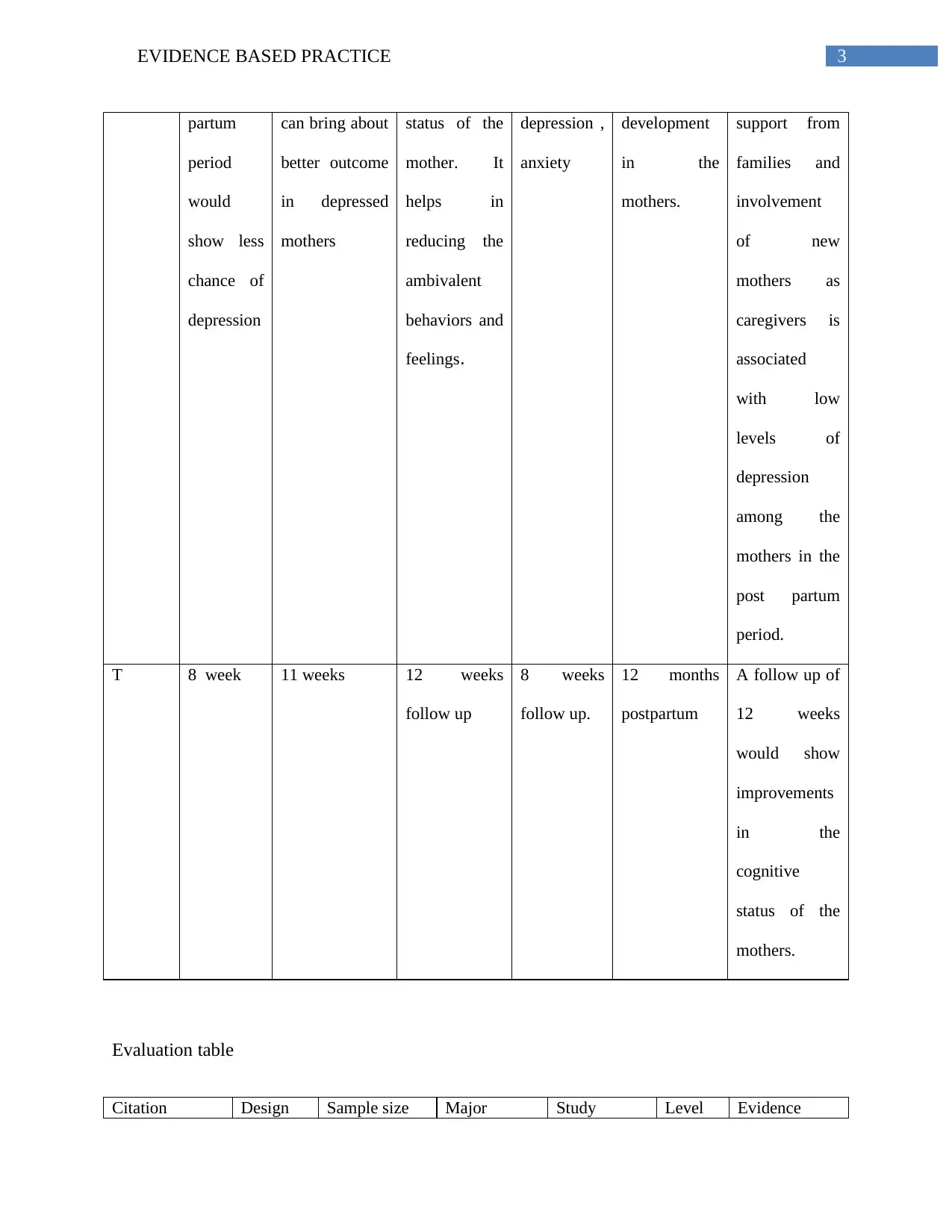
3EVIDENCE BASED PRACTICE
partum
period
would
show less
chance of
depression
can bring about
better outcome
in depressed
mothers
status of the
mother. It
helps in
reducing the
ambivalent
behaviors and
feelings.
depression ,
anxiety
development
in the
mothers.
support from
families and
involvement
of new
mothers as
caregivers is
associated
with low
levels of
depression
among the
mothers in the
post partum
period.
T 8 week 11 weeks 12 weeks
follow up
8 weeks
follow up.
12 months
postpartum
A follow up of
12 weeks
would show
improvements
in the
cognitive
status of the
mothers.
Evaluation table
Citation Design Sample size Major Study Level Evidence
partum
period
would
show less
chance of
depression
can bring about
better outcome
in depressed
mothers
status of the
mother. It
helps in
reducing the
ambivalent
behaviors and
feelings.
depression ,
anxiety
development
in the
mothers.
support from
families and
involvement
of new
mothers as
caregivers is
associated
with low
levels of
depression
among the
mothers in the
post partum
period.
T 8 week 11 weeks 12 weeks
follow up
8 weeks
follow up.
12 months
postpartum
A follow up of
12 weeks
would show
improvements
in the
cognitive
status of the
mothers.
Evaluation table
Citation Design Sample size Major Study Level Evidence
Paraphrase This Document
Need a fresh take? Get an instant paraphrase of this document with our AI Paraphraser
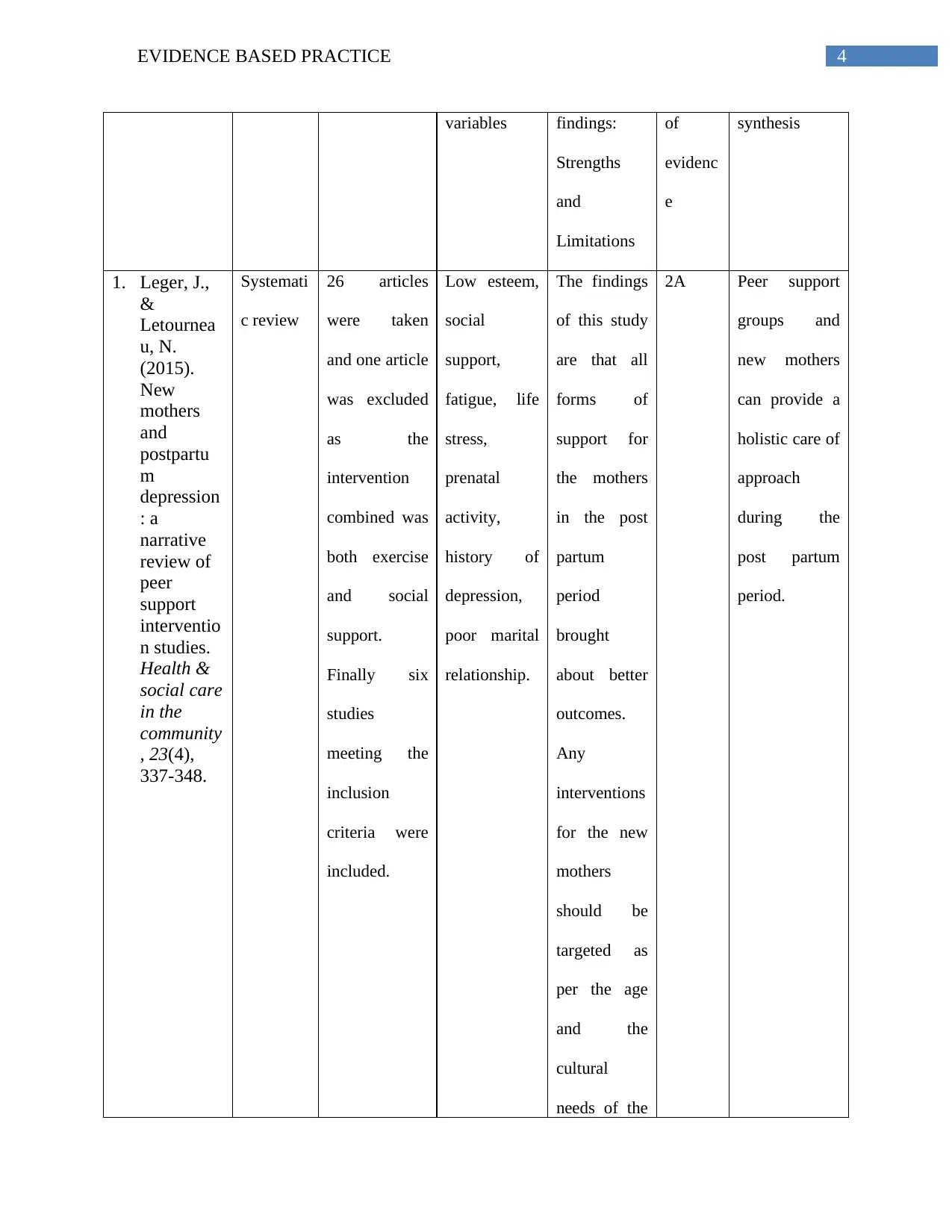
4EVIDENCE BASED PRACTICE
variables findings:
Strengths
and
Limitations
of
evidenc
e
synthesis
1. Leger, J.,
&
Letournea
u, N.
(2015).
New
mothers
and
postpartu
m
depression
: a
narrative
review of
peer
support
interventio
n studies.
Health &
social care
in the
community
, 23(4),
337-348.
Systemati
c review
26 articles
were taken
and one article
was excluded
as the
intervention
combined was
both exercise
and social
support.
Finally six
studies
meeting the
inclusion
criteria were
included.
Low esteem,
social
support,
fatigue, life
stress,
prenatal
activity,
history of
depression,
poor marital
relationship.
The findings
of this study
are that all
forms of
support for
the mothers
in the post
partum
period
brought
about better
outcomes.
Any
interventions
for the new
mothers
should be
targeted as
per the age
and the
cultural
needs of the
2A Peer support
groups and
new mothers
can provide a
holistic care of
approach
during the
post partum
period.
variables findings:
Strengths
and
Limitations
of
evidenc
e
synthesis
1. Leger, J.,
&
Letournea
u, N.
(2015).
New
mothers
and
postpartu
m
depression
: a
narrative
review of
peer
support
interventio
n studies.
Health &
social care
in the
community
, 23(4),
337-348.
Systemati
c review
26 articles
were taken
and one article
was excluded
as the
intervention
combined was
both exercise
and social
support.
Finally six
studies
meeting the
inclusion
criteria were
included.
Low esteem,
social
support,
fatigue, life
stress,
prenatal
activity,
history of
depression,
poor marital
relationship.
The findings
of this study
are that all
forms of
support for
the mothers
in the post
partum
period
brought
about better
outcomes.
Any
interventions
for the new
mothers
should be
targeted as
per the age
and the
cultural
needs of the
2A Peer support
groups and
new mothers
can provide a
holistic care of
approach
during the
post partum
period.
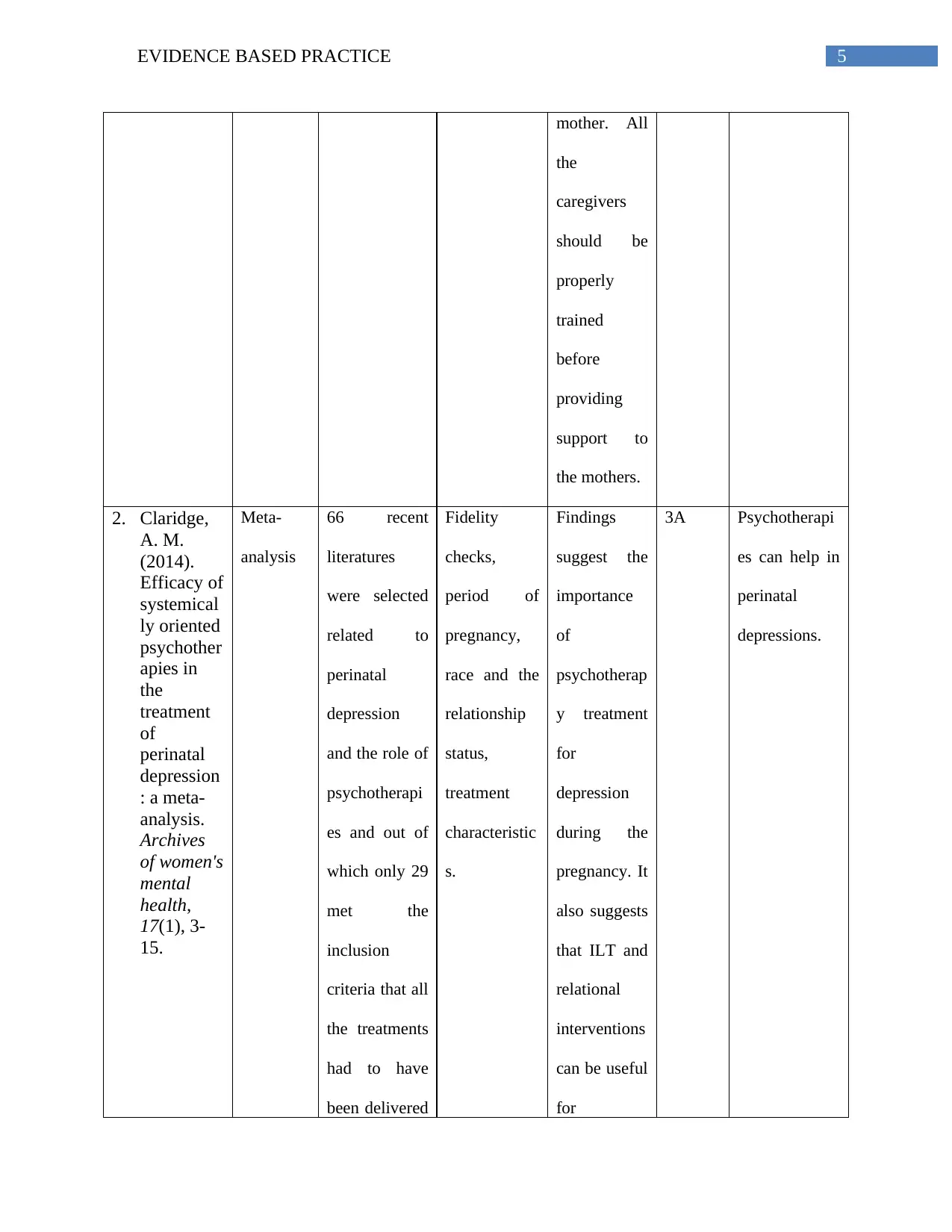
5EVIDENCE BASED PRACTICE
mother. All
the
caregivers
should be
properly
trained
before
providing
support to
the mothers.
2. Claridge,
A. M.
(2014).
Efficacy of
systemical
ly oriented
psychother
apies in
the
treatment
of
perinatal
depression
: a meta-
analysis.
Archives
of women's
mental
health,
17(1), 3-
15.
Meta-
analysis
66 recent
literatures
were selected
related to
perinatal
depression
and the role of
psychotherapi
es and out of
which only 29
met the
inclusion
criteria that all
the treatments
had to have
been delivered
Fidelity
checks,
period of
pregnancy,
race and the
relationship
status,
treatment
characteristic
s.
Findings
suggest the
importance
of
psychotherap
y treatment
for
depression
during the
pregnancy. It
also suggests
that ILT and
relational
interventions
can be useful
for
3A Psychotherapi
es can help in
perinatal
depressions.
mother. All
the
caregivers
should be
properly
trained
before
providing
support to
the mothers.
2. Claridge,
A. M.
(2014).
Efficacy of
systemical
ly oriented
psychother
apies in
the
treatment
of
perinatal
depression
: a meta-
analysis.
Archives
of women's
mental
health,
17(1), 3-
15.
Meta-
analysis
66 recent
literatures
were selected
related to
perinatal
depression
and the role of
psychotherapi
es and out of
which only 29
met the
inclusion
criteria that all
the treatments
had to have
been delivered
Fidelity
checks,
period of
pregnancy,
race and the
relationship
status,
treatment
characteristic
s.
Findings
suggest the
importance
of
psychotherap
y treatment
for
depression
during the
pregnancy. It
also suggests
that ILT and
relational
interventions
can be useful
for
3A Psychotherapi
es can help in
perinatal
depressions.
⊘ This is a preview!⊘
Do you want full access?
Subscribe today to unlock all pages.

Trusted by 1+ million students worldwide
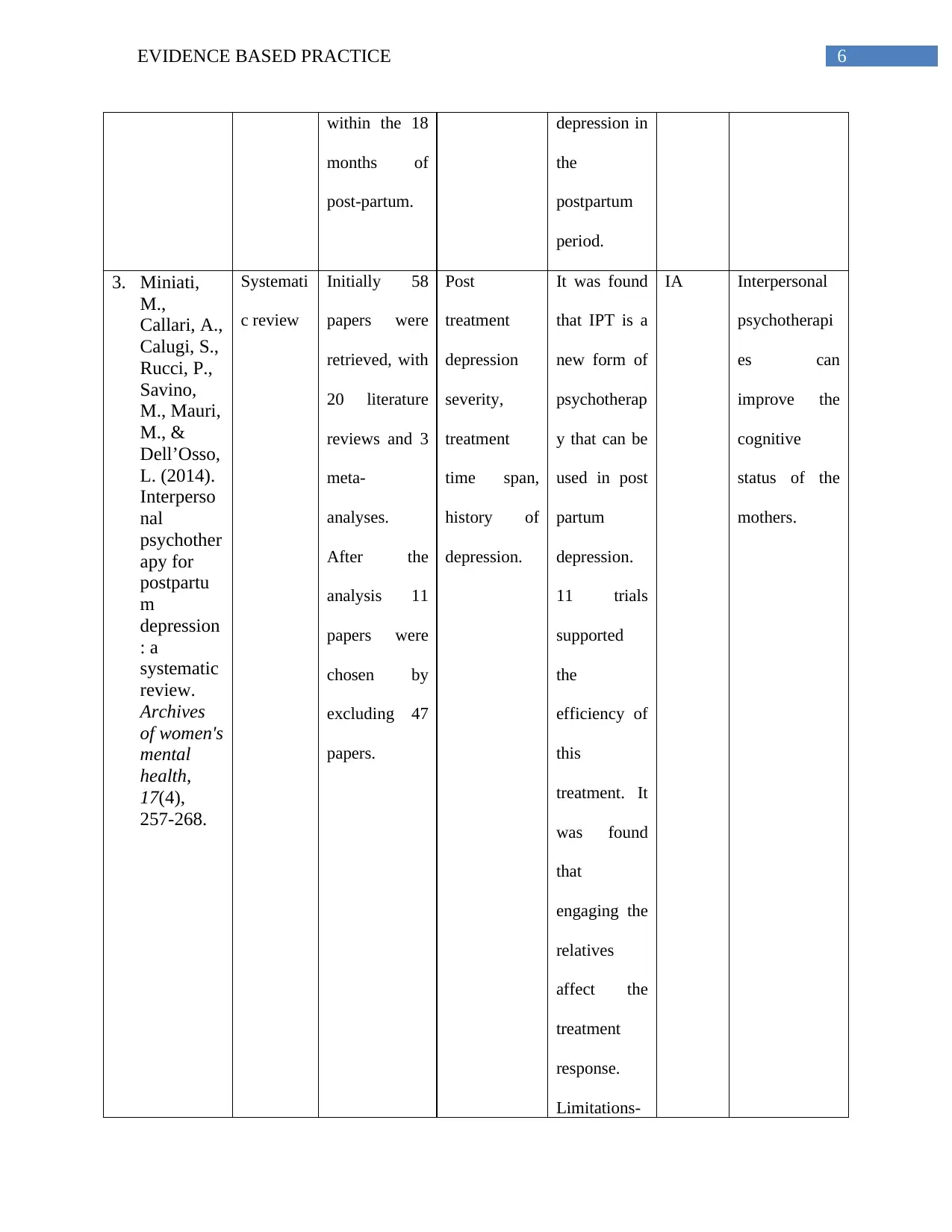
6EVIDENCE BASED PRACTICE
within the 18
months of
post-partum.
depression in
the
postpartum
period.
3. Miniati,
M.,
Callari, A.,
Calugi, S.,
Rucci, P.,
Savino,
M., Mauri,
M., &
Dell’Osso,
L. (2014).
Interperso
nal
psychother
apy for
postpartu
m
depression
: a
systematic
review.
Archives
of women's
mental
health,
17(4),
257-268.
Systemati
c review
Initially 58
papers were
retrieved, with
20 literature
reviews and 3
meta-
analyses.
After the
analysis 11
papers were
chosen by
excluding 47
papers.
Post
treatment
depression
severity,
treatment
time span,
history of
depression.
It was found
that IPT is a
new form of
psychotherap
y that can be
used in post
partum
depression.
11 trials
supported
the
efficiency of
this
treatment. It
was found
that
engaging the
relatives
affect the
treatment
response.
Limitations-
IA Interpersonal
psychotherapi
es can
improve the
cognitive
status of the
mothers.
within the 18
months of
post-partum.
depression in
the
postpartum
period.
3. Miniati,
M.,
Callari, A.,
Calugi, S.,
Rucci, P.,
Savino,
M., Mauri,
M., &
Dell’Osso,
L. (2014).
Interperso
nal
psychother
apy for
postpartu
m
depression
: a
systematic
review.
Archives
of women's
mental
health,
17(4),
257-268.
Systemati
c review
Initially 58
papers were
retrieved, with
20 literature
reviews and 3
meta-
analyses.
After the
analysis 11
papers were
chosen by
excluding 47
papers.
Post
treatment
depression
severity,
treatment
time span,
history of
depression.
It was found
that IPT is a
new form of
psychotherap
y that can be
used in post
partum
depression.
11 trials
supported
the
efficiency of
this
treatment. It
was found
that
engaging the
relatives
affect the
treatment
response.
Limitations-
IA Interpersonal
psychotherapi
es can
improve the
cognitive
status of the
mothers.
Paraphrase This Document
Need a fresh take? Get an instant paraphrase of this document with our AI Paraphraser
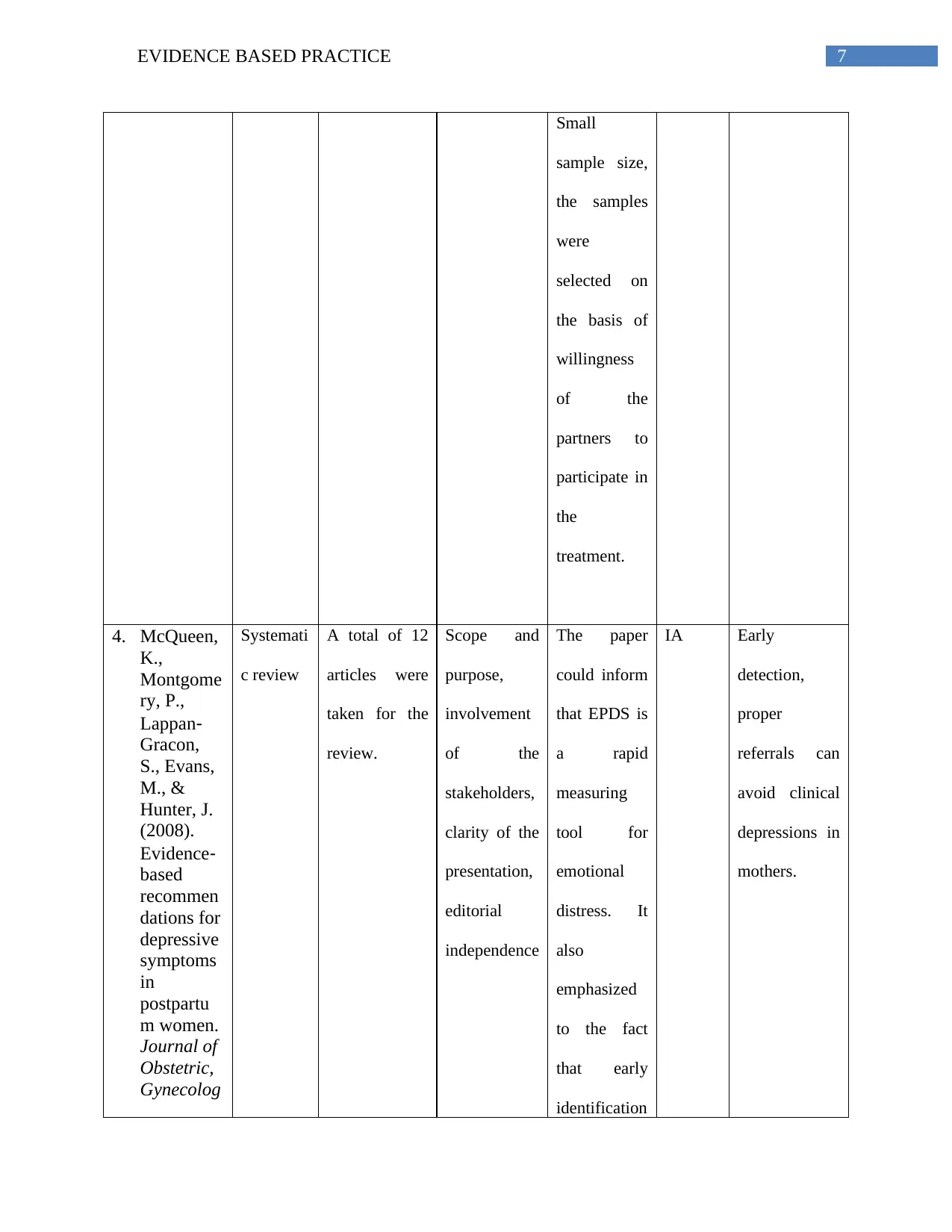
7EVIDENCE BASED PRACTICE
Small
sample size,
the samples
were
selected on
the basis of
willingness
of the
partners to
participate in
the
treatment.
4. McQueen,
K.,
Montgome
ry, P.,
Lappan‐
Gracon,
S., Evans,
M., &
Hunter, J.
(2008).
Evidence‐
based
recommen
dations for
depressive
symptoms
in
postpartu
m women.
Journal of
Obstetric,
Gynecolog
Systemati
c review
A total of 12
articles were
taken for the
review.
Scope and
purpose,
involvement
of the
stakeholders,
clarity of the
presentation,
editorial
independence
The paper
could inform
that EPDS is
a rapid
measuring
tool for
emotional
distress. It
also
emphasized
to the fact
that early
identification
IA Early
detection,
proper
referrals can
avoid clinical
depressions in
mothers.
Small
sample size,
the samples
were
selected on
the basis of
willingness
of the
partners to
participate in
the
treatment.
4. McQueen,
K.,
Montgome
ry, P.,
Lappan‐
Gracon,
S., Evans,
M., &
Hunter, J.
(2008).
Evidence‐
based
recommen
dations for
depressive
symptoms
in
postpartu
m women.
Journal of
Obstetric,
Gynecolog
Systemati
c review
A total of 12
articles were
taken for the
review.
Scope and
purpose,
involvement
of the
stakeholders,
clarity of the
presentation,
editorial
independence
The paper
could inform
that EPDS is
a rapid
measuring
tool for
emotional
distress. It
also
emphasized
to the fact
that early
identification
IA Early
detection,
proper
referrals can
avoid clinical
depressions in
mothers.
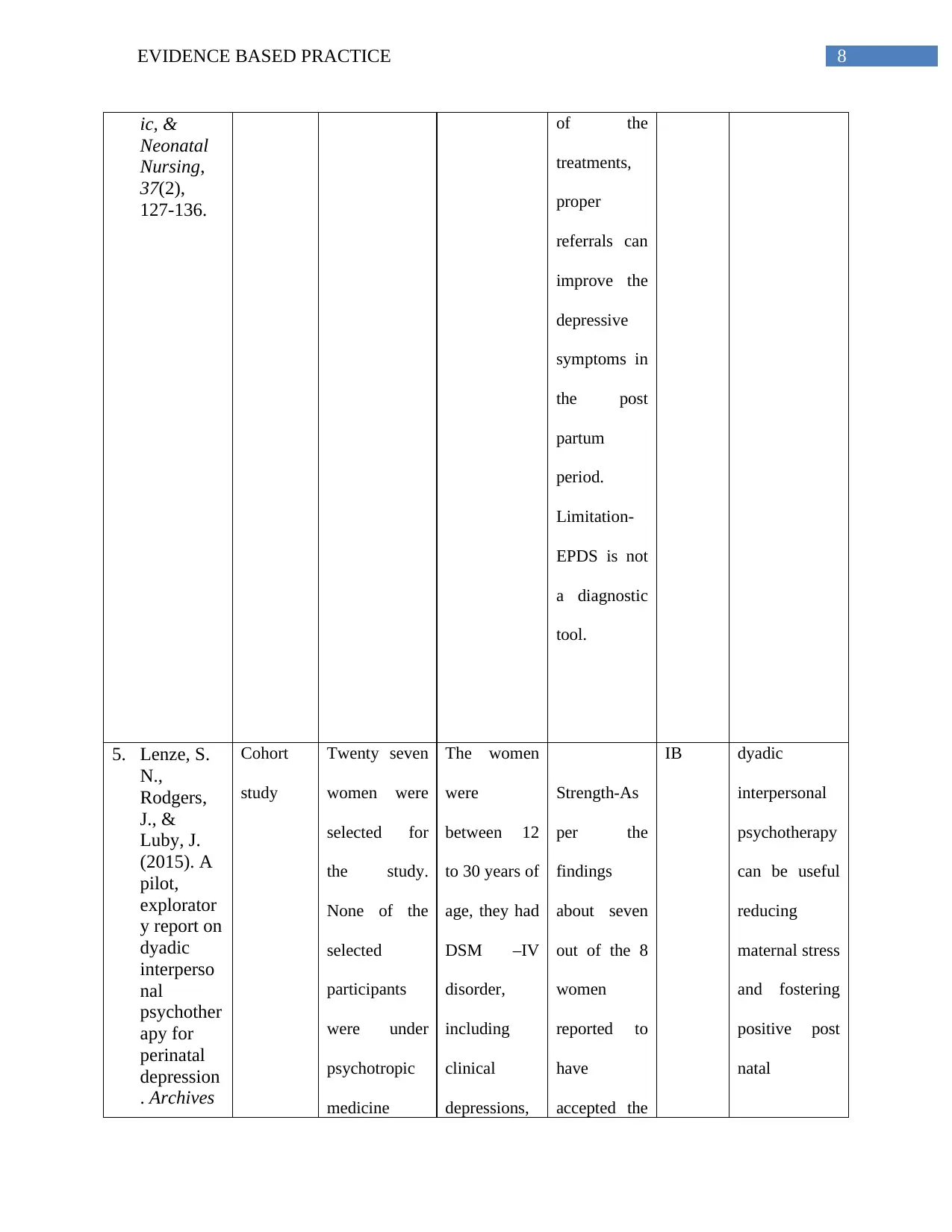
8EVIDENCE BASED PRACTICE
ic, &
Neonatal
Nursing,
37(2),
127-136.
of the
treatments,
proper
referrals can
improve the
depressive
symptoms in
the post
partum
period.
Limitation-
EPDS is not
a diagnostic
tool.
5. Lenze, S.
N.,
Rodgers,
J., &
Luby, J.
(2015). A
pilot,
explorator
y report on
dyadic
interperso
nal
psychother
apy for
perinatal
depression
. Archives
Cohort
study
Twenty seven
women were
selected for
the study.
None of the
selected
participants
were under
psychotropic
medicine
The women
were
between 12
to 30 years of
age, they had
DSM –IV
disorder,
including
clinical
depressions,
Strength-As
per the
findings
about seven
out of the 8
women
reported to
have
accepted the
IB dyadic
interpersonal
psychotherapy
can be useful
reducing
maternal stress
and fostering
positive post
natal
ic, &
Neonatal
Nursing,
37(2),
127-136.
of the
treatments,
proper
referrals can
improve the
depressive
symptoms in
the post
partum
period.
Limitation-
EPDS is not
a diagnostic
tool.
5. Lenze, S.
N.,
Rodgers,
J., &
Luby, J.
(2015). A
pilot,
explorator
y report on
dyadic
interperso
nal
psychother
apy for
perinatal
depression
. Archives
Cohort
study
Twenty seven
women were
selected for
the study.
None of the
selected
participants
were under
psychotropic
medicine
The women
were
between 12
to 30 years of
age, they had
DSM –IV
disorder,
including
clinical
depressions,
Strength-As
per the
findings
about seven
out of the 8
women
reported to
have
accepted the
IB dyadic
interpersonal
psychotherapy
can be useful
reducing
maternal stress
and fostering
positive post
natal
⊘ This is a preview!⊘
Do you want full access?
Subscribe today to unlock all pages.

Trusted by 1+ million students worldwide
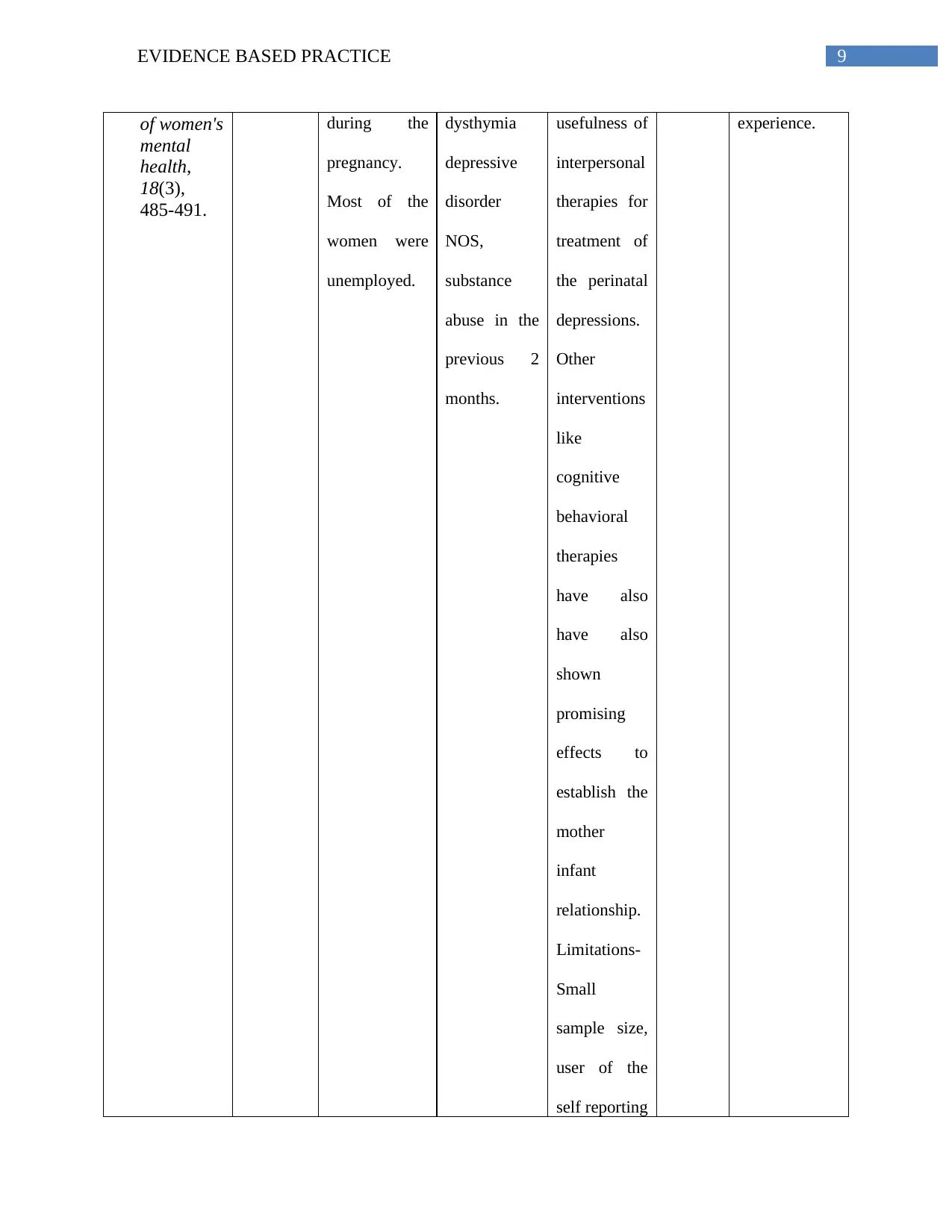
9EVIDENCE BASED PRACTICE
of women's
mental
health,
18(3),
485-491.
during the
pregnancy.
Most of the
women were
unemployed.
dysthymia
depressive
disorder
NOS,
substance
abuse in the
previous 2
months.
usefulness of
interpersonal
therapies for
treatment of
the perinatal
depressions.
Other
interventions
like
cognitive
behavioral
therapies
have also
have also
shown
promising
effects to
establish the
mother
infant
relationship.
Limitations-
Small
sample size,
user of the
self reporting
experience.
of women's
mental
health,
18(3),
485-491.
during the
pregnancy.
Most of the
women were
unemployed.
dysthymia
depressive
disorder
NOS,
substance
abuse in the
previous 2
months.
usefulness of
interpersonal
therapies for
treatment of
the perinatal
depressions.
Other
interventions
like
cognitive
behavioral
therapies
have also
have also
shown
promising
effects to
establish the
mother
infant
relationship.
Limitations-
Small
sample size,
user of the
self reporting
experience.
Paraphrase This Document
Need a fresh take? Get an instant paraphrase of this document with our AI Paraphraser

10EVIDENCE BASED PRACTICE
scale.
scale.
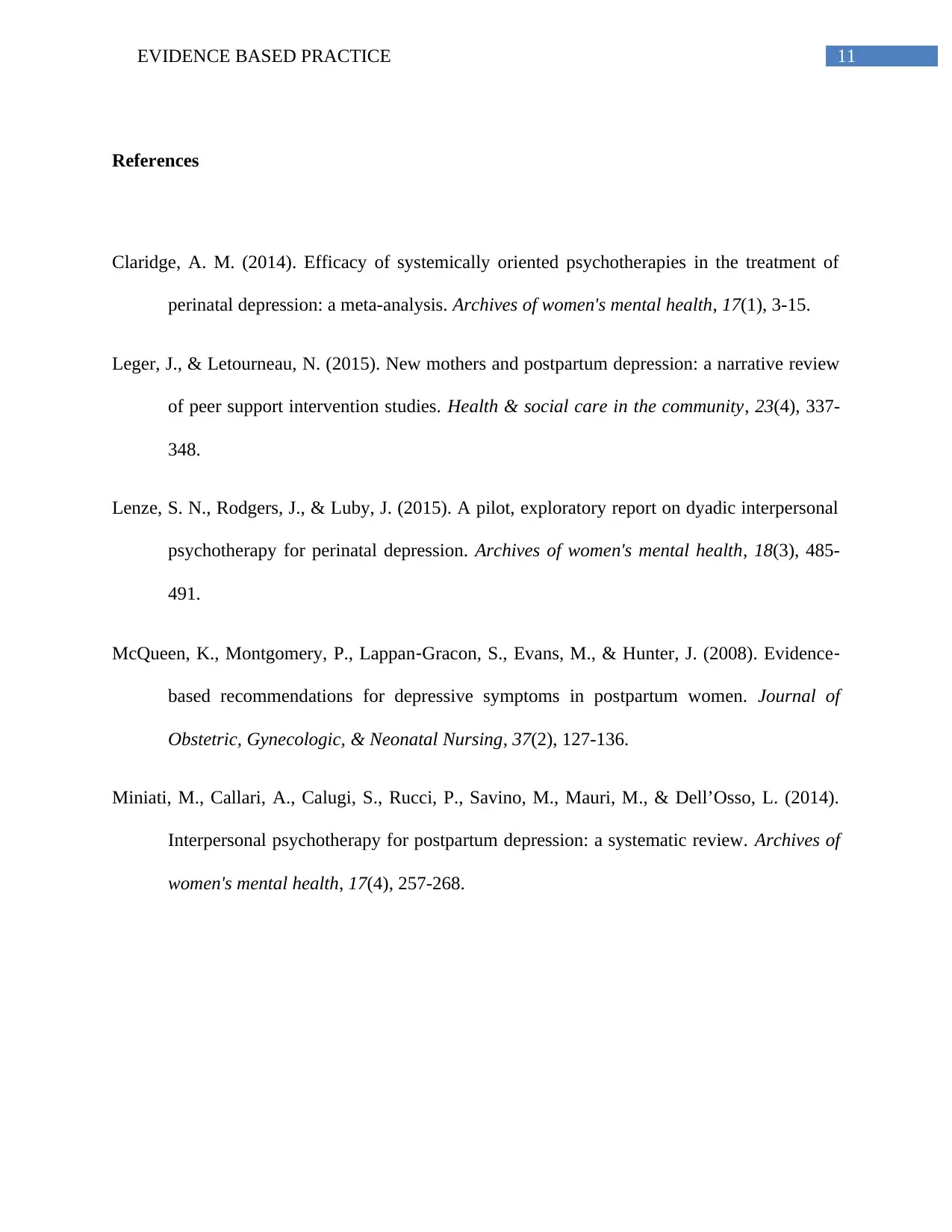
11EVIDENCE BASED PRACTICE
References
Claridge, A. M. (2014). Efficacy of systemically oriented psychotherapies in the treatment of
perinatal depression: a meta-analysis. Archives of women's mental health, 17(1), 3-15.
Leger, J., & Letourneau, N. (2015). New mothers and postpartum depression: a narrative review
of peer support intervention studies. Health & social care in the community, 23(4), 337-
348.
Lenze, S. N., Rodgers, J., & Luby, J. (2015). A pilot, exploratory report on dyadic interpersonal
psychotherapy for perinatal depression. Archives of women's mental health, 18(3), 485-
491.
McQueen, K., Montgomery, P., Lappan‐Gracon, S., Evans, M., & Hunter, J. (2008). Evidence‐
based recommendations for depressive symptoms in postpartum women. Journal of
Obstetric, Gynecologic, & Neonatal Nursing, 37(2), 127-136.
Miniati, M., Callari, A., Calugi, S., Rucci, P., Savino, M., Mauri, M., & Dell’Osso, L. (2014).
Interpersonal psychotherapy for postpartum depression: a systematic review. Archives of
women's mental health, 17(4), 257-268.
References
Claridge, A. M. (2014). Efficacy of systemically oriented psychotherapies in the treatment of
perinatal depression: a meta-analysis. Archives of women's mental health, 17(1), 3-15.
Leger, J., & Letourneau, N. (2015). New mothers and postpartum depression: a narrative review
of peer support intervention studies. Health & social care in the community, 23(4), 337-
348.
Lenze, S. N., Rodgers, J., & Luby, J. (2015). A pilot, exploratory report on dyadic interpersonal
psychotherapy for perinatal depression. Archives of women's mental health, 18(3), 485-
491.
McQueen, K., Montgomery, P., Lappan‐Gracon, S., Evans, M., & Hunter, J. (2008). Evidence‐
based recommendations for depressive symptoms in postpartum women. Journal of
Obstetric, Gynecologic, & Neonatal Nursing, 37(2), 127-136.
Miniati, M., Callari, A., Calugi, S., Rucci, P., Savino, M., Mauri, M., & Dell’Osso, L. (2014).
Interpersonal psychotherapy for postpartum depression: a systematic review. Archives of
women's mental health, 17(4), 257-268.
⊘ This is a preview!⊘
Do you want full access?
Subscribe today to unlock all pages.

Trusted by 1+ million students worldwide
1 out of 13
Related Documents
Your All-in-One AI-Powered Toolkit for Academic Success.
+13062052269
info@desklib.com
Available 24*7 on WhatsApp / Email
![[object Object]](/_next/static/media/star-bottom.7253800d.svg)
Unlock your academic potential
Copyright © 2020–2026 A2Z Services. All Rights Reserved. Developed and managed by ZUCOL.




